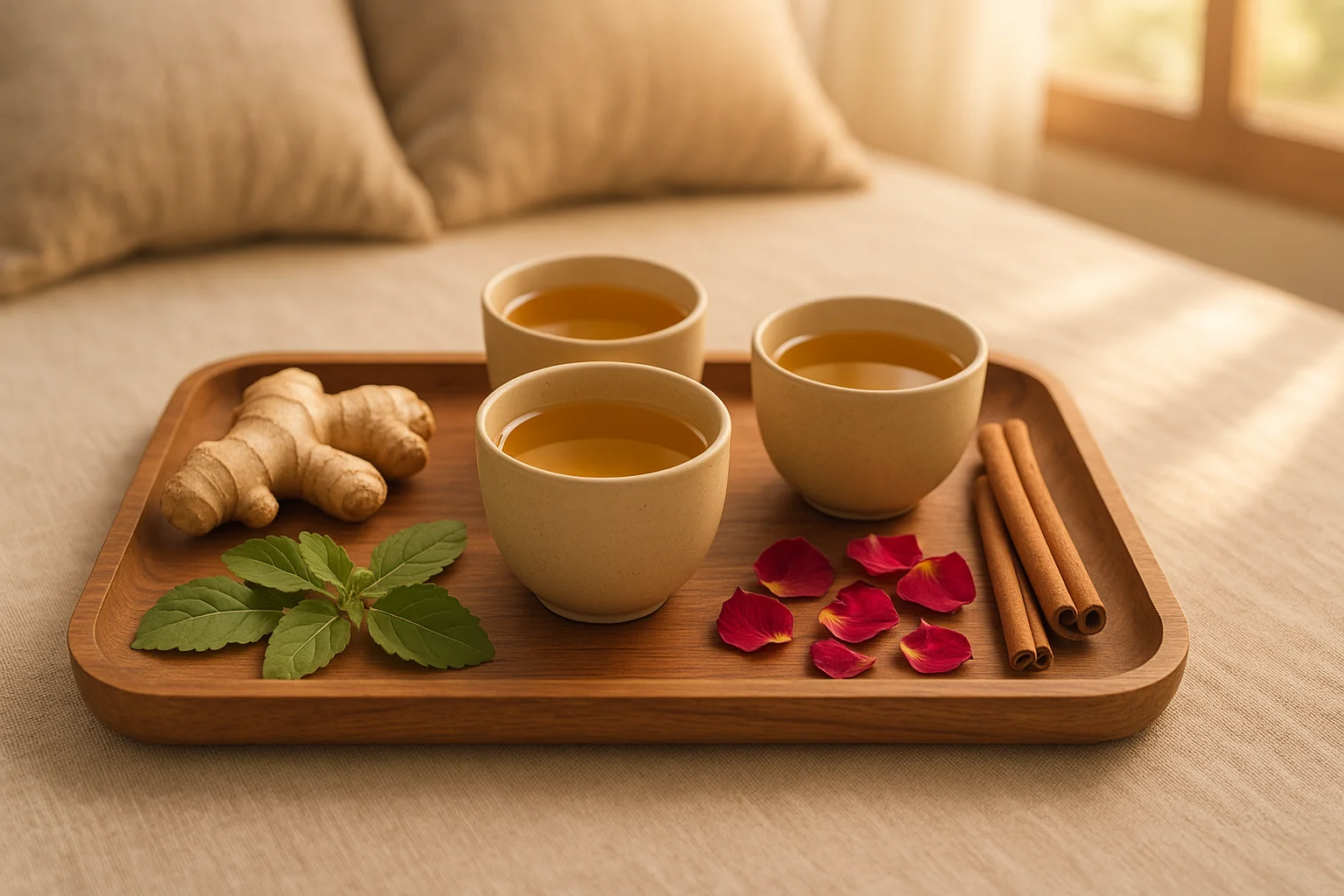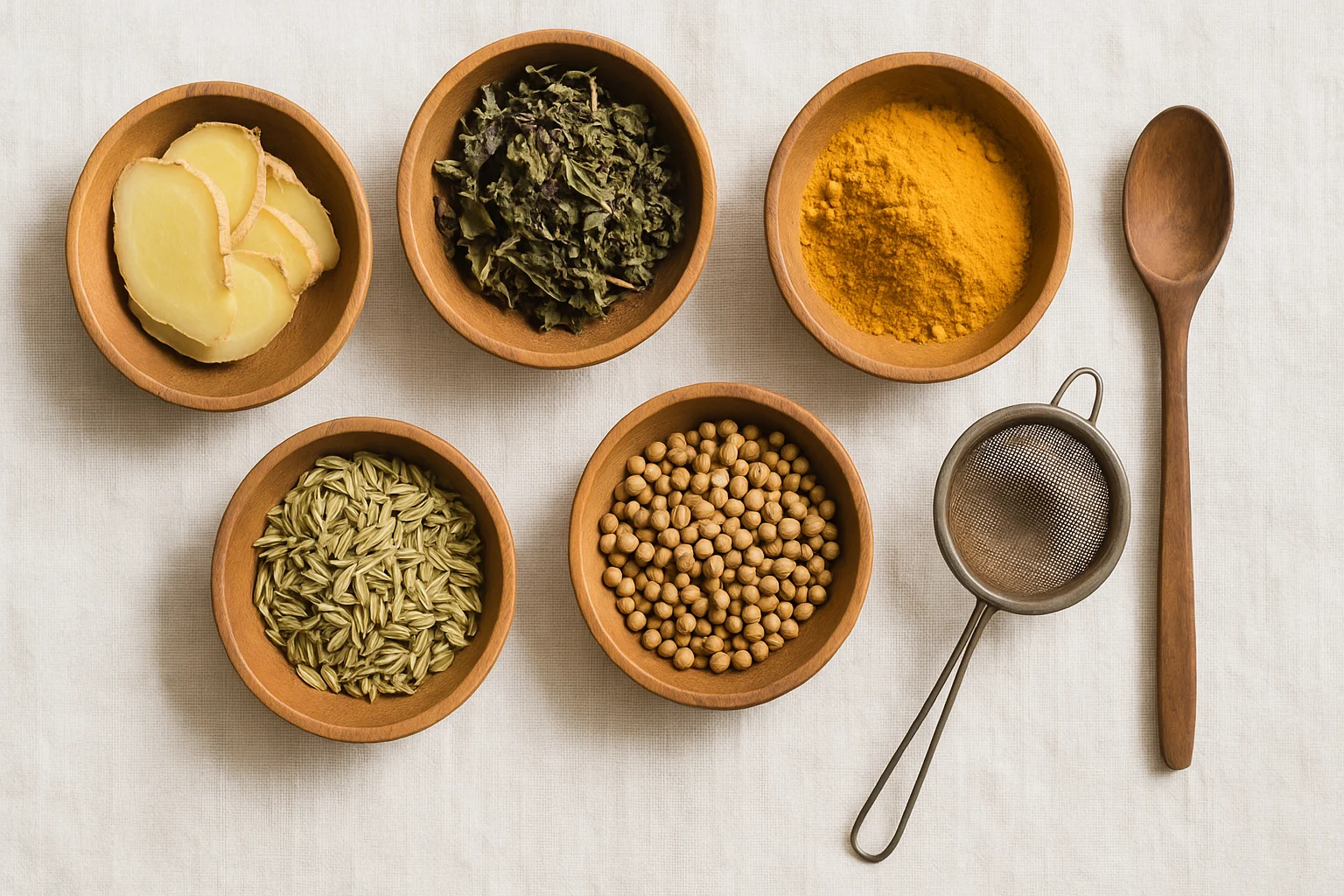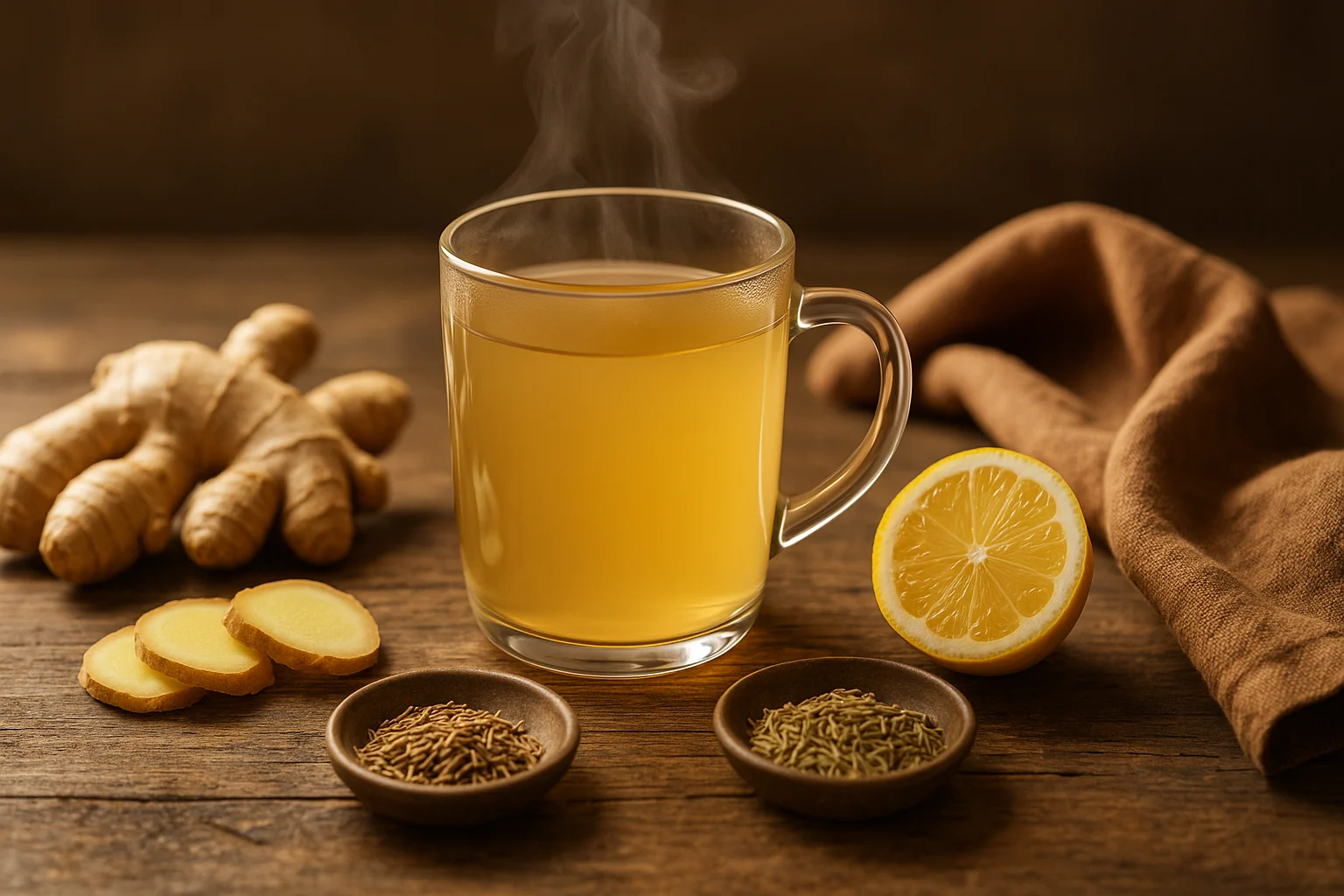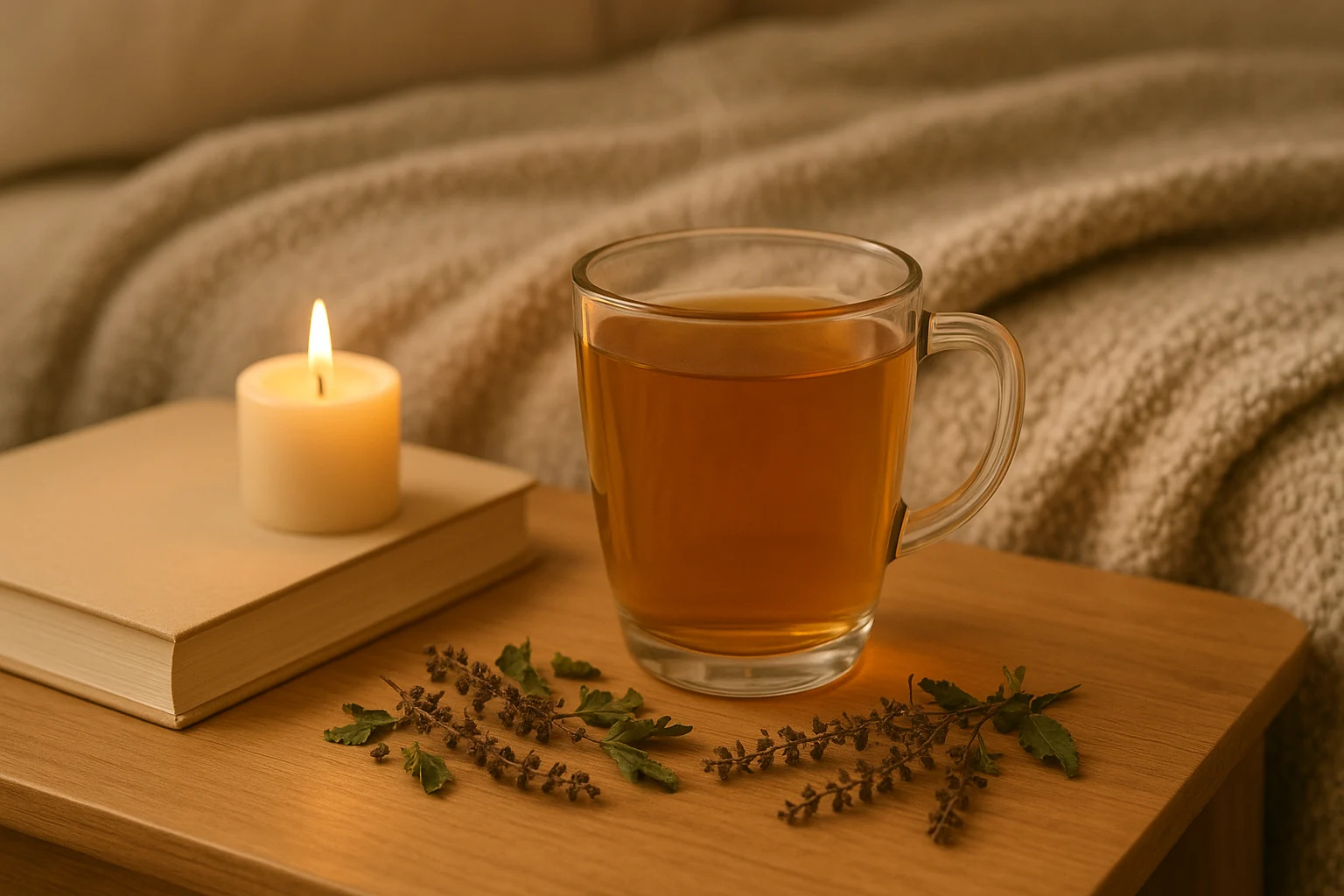
Can a 5,000-year-old tea recipe soothe your stress or support your digestion in minutes? Welcome to the world of Ayurvedic teas, where every sip brings you closer to harmony. These teas are just one element in a holistic Ayurvedic lifestyle—explore how they fit into the broader ayurvedic wellness guide to natural support. From digestion to calm, discover Ayurvedic tea benefits tailored to your needs.
Find Your Perfect Tea!This page contains paid/affiliate links. As an Amazon Associate we earn from qualifying purchases, and we may earn commissions from other partners—at no extra cost to you. Links marked with ‘#ad’ are affiliate links, meaning we may earn a commission at no extra cost to you. Learn more.
Table of Contents
Ayurvedic Tea Benefits: Key Takeaways
These teas align mind, body, and spirit, offering gentle, practical support tailored to your unique needs.
- Holistic Wellness: Crafted from ancient principles, these teas promote balance, targeting goals like digestion or stress relief.
- Dosha Alignment: Tailoring teas to your Vata, Pitta, or Kapha type may help prevent imbalances and maximize comfort.
- Supportive Effects: Herbs like ginger and tulsi may support well-being.
- Daily Ease: Many Ayurvedic teas are caffeine-free, fitting effortlessly into your routine.
- Simple Prep: With basic ingredients, you can brew these teas at home for gentle, gradual results.

What Are Ayurvedic Teas? A Glimpse Into Ancient Healing
Ayurveda, the “science of life,” is an ancient holistic system from India. These herbal blends, rooted in Ayurveda, are crafted to balance your unique blend of three doshas—Vata (air), Pitta (fire), and Kapha (earth)—that influence well-being. For instance, when I learned about my Vata dominance, warming teas like ginger helped me feel grounded. Balance brings vitality, while imbalances may cause discomfort.
Unlike regular teas, these herbal infusions are intentional combinations of herbs and spices chosen for their properties (warming, cooling, drying). They may support digestion, ease tension, support immune health, or assist the body’s natural cleansing, often caffeine-free for all-day use. For more on Ayurveda’s principles, explore Banyan Botanicals’ guide.
The Role of Herbs in Ayurvedic Tea
Each herb has unique qualities, or guna. For example:
- Ginger: Warms and may aid digestion. 🔥
- Turmeric: May help manage inflammation. 🧡
- Tulsi (Holy Basil): May ease stress and is considered an adaptogen in herbal traditions. 🧘♀️
- Coriander: Cools and may support digestion. 🌬️
By selecting teas aligned with your needs, you can tap into nature’s supportive potential.
Top Ayurvedic Teas for Your Wellness Goals
Explore the best herbal teas for your needs—this guide to Ayurvedic tea organizes them by wellness goals. To personalize your choice, consider your dosha with an online quiz or an Ayurvedic practitioner.
Ayurveda Tea Guide: Quick Start
Use the quick list below to match blends to goals, then fine-tune based on your dosha.
Healing Herbal Teas for Digestive Health
A strong digestive fire, or Agni, is valued in Ayurveda. Herbal wellness teas like ginger and CFC may enhance comfort after meals.
Ginger Tea (Adrak Chai) 🌶️
- Benefits: Ginger is warming and may stimulate digestive enzymes, ease bloating and nausea, and support circulation.
- Dosha Fit: Ideal for Vata (warms, calms gas) and Kapha (stimulates digestion). Pitta types use sparingly.
- Prep: Simmer a 1-inch slice of fresh ginger in water for 5–10 minutes. Strain, add lemon or honey if desired.
- When: Before or after meals, especially in cold weather.
- Caffeine-Free? Yes.
- Cautions: Pitta types with acidity should limit use or pair with cooling herbs.
- Modern Uses: Commonly used for morning sickness, motion sickness, and colds; evidence varies.
Cumin-Fennel-Coriander (CFC) Tea 🌱
- Benefits: This blend may aid digestion, ease gas, and soothe acidity. Cumin supports digestion, fennel cools, and coriander helps balance Pitta.
- Dosha Fit: Great for all doshas, especially Pitta and Vata.
- Prep: Simmer ½ tsp each of cumin, fennel, and coriander seeds in 2 cups water for 5–10 minutes. Strain and sip.
- When: After meals, especially heavy ones.
- Caffeine-Free? Yes.
- Cautions: Generally safe for all.
- Modern Uses: Traditionally used to ease bloating or heartburn and to support gentle cleansing.
“Think of detox as supporting your body’s natural renewal processes.” — Ayurvedic Wisdom

Calming Herbal Teas for Stress Relief
In our hectic lives, these teas can soothe nerves, tapping into Ayurvedic tea benefits for peace. I’ve found tulsi tea calming after a long day, much like practicing yoga and breathwork for stress relief.
Tulsi (Holy Basil) Tea 🌿
- Benefits: An adaptogen, tulsi may reduce perceived stress, support the body’s stress response, and may support immune health.
- Dosha Fit: Balances all doshas, slightly warming for Vata and Kapha, supportive for Pitta.
- Prep: Steep 1 tsp dried tulsi leaves (or 5–6 fresh) in hot water for 5–10 minutes.
- When: Morning for calm focus or evening to unwind.
- Caffeine-Free? Yes.
- Cautions: Safe for most; may interact with blood-thinning—consult a professional.
- Modern Uses: Commonly used for stress support and seasonal wellness.
Brahmi (Bacopa Monnieri) Tea 🧠
- Benefits: May support memory and focus and help calm an overactive mind. Cooling, it can soothe Pitta.
- Dosha Fit: Best for Pitta and Vata; Kapha benefits from clarity.
- Prep: Steep ½–1 tsp dried brahmi in hot water for 5–10 minutes. Add honey for taste.
- When: Morning for focus or evening for calm.
- Caffeine-Free? Yes.
- Cautions: May cause mild stomach upset in large doses.
- Modern Uses: Commonly used for focus and relaxation.
Detoxifying Herbal Blends
These herbal blends are used in Ayurveda to support the body’s natural elimination processes (reducing “ama,” or metabolic residue, in Ayurvedic terms). Triphala is my go-to for regularity, much like manjistha supports detoxification in Ayurveda.
Triphala Tea 🍇
- Benefits: Combines Amalaki, Bibhitaki, and Haritaki to support regularity, digestion, and antioxidant support.
- Dosha Fit: Balances all doshas.
- Prep: Stir ½–1 tsp triphala powder in warm water, let sit, and drink. Add honey or ginger for taste.
- When: Morning or bedtime for bowel regularity.
- Caffeine-Free? Yes.
- Cautions: Avoid during pregnancy; start with a small dose.
- Modern Uses: Commonly used to ease occasional constipation and support overall vitality.
Warming Herbal Teas for Circulation
Perfect for cold hands or a sluggish morning. Cinnamon tea warms me up on chilly days.
Cinnamon Tea (Dalchini Chai) 🤎
- Benefits: Warms, may support circulation, may help maintain healthy blood sugar levels when combined with a balanced diet, and may aid digestion.
- Dosha Fit: Great for Vata and Kapha; Pitta use sparingly.
- Prep: Simmer 1 cinnamon stick or ½ tsp powder in 1 cup water for 10–15 minutes.
- When: Morning or daytime for a boost.
- Caffeine-Free? Yes.
- Cautions: Prefer Ceylon cinnamon; limit for Pitta.
- Modern Uses: Commonly used for warmth and comfort.
Clove Tea (Laung Chai) 🌰
- Benefits: Stimulates circulation, may help clear congestion, and is traditionally used for temporary oral discomfort.
- Dosha Fit: Best for Vata and Kapha; Pitta avoid large amounts.
- Prep: Simmer 2–3 cloves in 1 cup water for 5–7 minutes.
- When: Cold months or for congestion.
- Caffeine-Free? Yes.
- Cautions: Avoid with bleeding disorders or blood thinners.
- Modern Uses: Traditionally used for sore throats, coughs, or tooth discomfort.
Cooling Herbal Teas for Inflammation
These teas soothe heat sensations, ideal for Pitta tendencies. Rose tea feels like a gentle hug on hot days, much like an Ayurvedic face care routine for glowing skin.
Rose Tea (Gulab Jal Chai) 🌹
- Benefits: Cools, calms, and uplifts. May reduce heat sensations, support skin comfort, and uplift mood.
- Dosha Fit: Best for Pitta and Vata; Kapha use moderately.
- Prep: Steep 1–2 tsp dried rose petals in hot water for 5–10 minutes.
- When: Hot weather or when stressed.
- Caffeine-Free? Yes.
- Cautions: Generally safe.
- Modern Uses: Commonly used for cooling and mood support.
Licorice Root Tea (Mulethi Chai) 🍬
- Benefits: May soothe irritation, calm digestion, and support the body’s stress response. I love its sweet flavor, which pairs well with its health benefits.
- Dosha Fit: Great for Pitta and Vata; Kapha use sparingly.
- Prep: Simmer 1 tsp licorice root in 1 cup water for 10–15 minutes.
- When: For irritation or sore throats.
- Caffeine-Free? Yes.
- Cautions: Avoid with high blood pressure or pregnancy.
- Modern Uses: Traditionally used for reflux symptoms, coughs, and stress support.

Find Your Perfect Ayurvedic Tea
This Ayurveda tea guide tool helps you select the best tea for your wellness goals and taste preferences.
Your personalized tea suggestion will appear here!
My Favorite Ayurvedic Teas to Start With
Top 3Three easy, everyday picks that align with common goals—calm, digestion, and cozy warmth.
Organic India Tulsi Original
Gentle “liquid yoga” for a calmer day—great any time.
- Best for: Calm & clarity
- Format: 18-ct
Banyan Botanicals CCF Tea
Classic cumin–coriander–fennel for light, post-meal comfort.
- Best for: Digestion
- Format: 3.5 oz
LeafLea Cinnamon Tea Bags
Cozy, warming spice when you want circulation support and comfort.
- Best for: Warmth & comfort
- Format: 40-ct
Frequently Asked Questions About Ayurvedic Tea
Helpful tools for brewing
Reinmoson extra-fine tea strainers — keeps fine spices (like fennel or brahmi) out of your cup for a cleaner sip.
Reusable cotton tea filter bags — quick, mess-free way to brew loose herbs (perfect for CCF or licorice root).
HIWARE 1000 ml glass teapot with infuser — stovetop-safe pot for easy batch brewing when you want a few cups ready.
Your Ayurvedic Tea Journey Begins
Ayurvedic teas blend ancient wisdom with modern wellness. Use this Ayurveda tea guide to start matching herbs to your dosha and goals, turning each sip into a ritual of balance. Whether supporting digestion, calming nerves, or warming your core, these teas offer gentle, natural support. Begin today, listen to your body, and enjoy vitality, one cup at a time!


